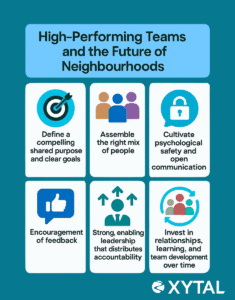
When we discuss neighbourhood teams, integration, and transformation, it can be easy to focus on structures, the process, the data, and the results. But at the heart of this is the ability of people to work together to give the best care to the person in front of them. Ultimately, there is a need for a high-performing team (HPT) for Neighbourhood Teams to be successful.
Why are High-Performing Teams vital for Neighbourhood Teams?
A significant part of a high-performing team is the requirement of a group of skilled individuals; however, this is not enough. We can all remember sports teams that have the best players but are not successful.
The team needs to have a shared purpose, clear goals, and a culture of trust that enables members to challenge, support, and inspire one another.
Now, we put this into the context of Neighbourhood Teams we can begin to understand the challenges. Neighbourhood Teams comprises multiple agencies, health and social care partners, voluntary organisations, and local communities.
Each has its own priorities, pressures, and ways of working. Without strong collaboration, efforts risk being fragmented, with duplication in some areas and gaps in others.
How to develop a High Performing Team
Creating an HPT doesn’t happen by accident. It requires focused investment in culture, design, leadership, systems, and one of the most essential elements: TIME.
Here are six areas to develop an HPT
- Define a compelling shared purpose and clear goals.
A recurring barrier to team success is a lack of clarity on mission, vision, and goals. Rabkin & Frein (2021) highlighted in their review of HPT that the failure to have a clear statement of goals, which are refreshed as needed, impacts the development of high-performance teams. Defining the mission, vision, and goals is the starting point for any team.
Questions: Do your team members have clarity on what the team is trying to achieve? Do they have clarity on their purpose in mission. - Assemble the right mix of people
Successful teams have the right mix of people in terms of skill set and want to develop relationships. Teams benefit from having diverse perspectives, capabilities, backgrounds, and personalities – this is a massive positive for neighbouring teams as there is a wealth of diversity and knowledge.
Questions: Do you have a diverse mix of people on your team? - Cultivate psychological safety and. open communication

Psychological safety has emerged as a key factor in discussions about team success. It is simply the feeling that people can speak up, fail, and learn without fear of retribution.
Amy C. Edmondson, a Harvard Business School professor and expert in the area of Psychological safety, highlighted – “Psychological safety is the belief that one will not be punished or humiliated for speaking up with ideas, questions, concerns or mistakes”.
Team leaders are key to developing psychological safety, as they can model this type of behaviour, which allow others to follow. - Encouragement of feedback
High-performing teams are created on feedback. Having spent time in high performance sports the best players seek feedback to improve not to validate their performance. For neighbouring teams, there needs to be an ability and opportunity to share reflections, highlight failures, and a way to adjust the course if required. In a health care setting this can be a challenge due to lack of time, however, it is required. Best practice around feedback relates back to point number 1. the importance of understanding the mission and having a clear purpose.
Questions: Are we moving in the right direction? What is working well? What can be improved. - Strong, enabling leadership that distributes accountability
Leaders should set direction, role-model best practices, and motivate others. The most outstanding leaders empower everyone to contribute and avoid control and micromanaging. - Invest in relationships, learning, and team development over time.
Teamwork and developing relationships take time and energy. Trust and shared norms don’t emerge overnight. This can be the biggest challenge within healthcare, as there us a lack of time to create working relationships, and development is more fragile and slower due to the hybrid nature of work. Research shows that while teams can build initial “swift trust” in weeks, deep, resilient trust often takes months or even years of consistent collaboration (Lansing et al, 2023).We understand that teams that take the time away from individual work to spend together see the rewards in collective performance.
Conclusion
Neighbourhood teams are not simply a technical or structural undertaking—it’s about people, relationships, and shared purpose. The NHS “Care Close to Home / Integrated Neighbourhoods” work illustrates how integrated, cross-disciplinary teams can transform care delivery when built on solid foundations of high performance.
References
Rabkin, S. W., & Frein, M. (2021). Overcoming Obstacles to Develop High-Performance Teams Involving Physician in Health Care Organizations. Healthcare (Basel, Switzerland), 9(9), 1136. https://doi.org/10.3390/healthcare9091136
Lansing, A.E., Romero, N.J., Siantz, E. et al. Building trust: Leadership reflections on community empowerment and engagement in a large urban initiative. BMC Public Health 23, 1252 (2023). https://doi.org/10.1186/s12889-023-15860-z








